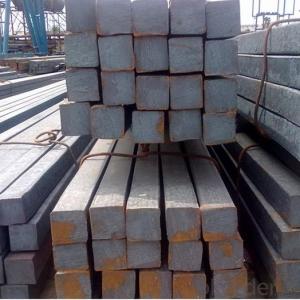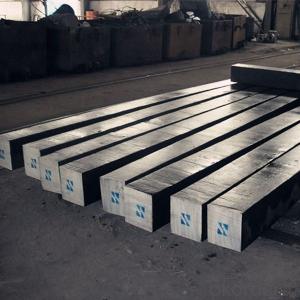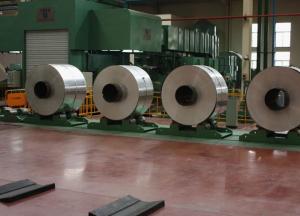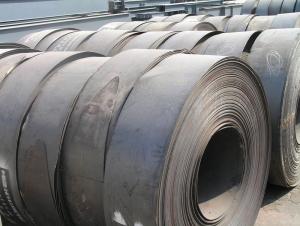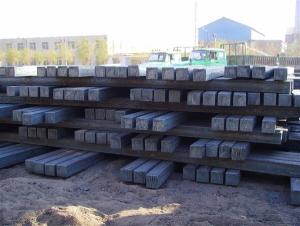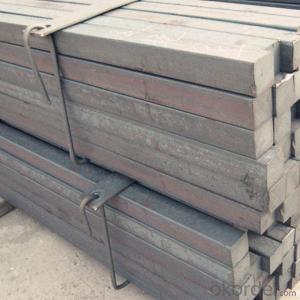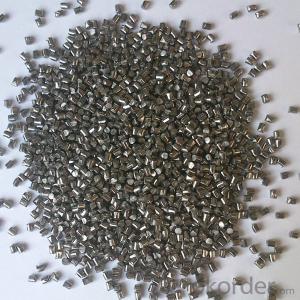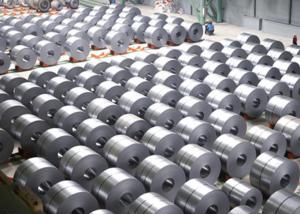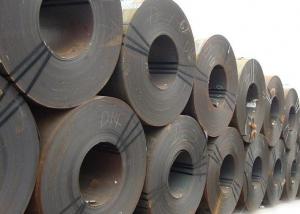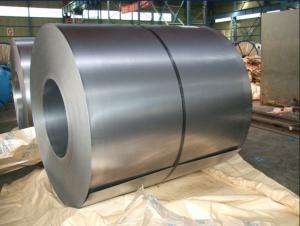Prime Mild Square Steel Billet/Billets/Square Billet Steel
- Loading Port:
- China main port
- Payment Terms:
- TT OR LC
- Min Order Qty:
- 20 m.t.
- Supply Capability:
- 10000 m.t./month
OKorder Service Pledge
OKorder Financial Service
You Might Also Like
Item specifice
Speciation
Standard: ASTM,GB,EN,BS,ect
Grade: Q195/215/235/345/45#/3SP/5SP,Gr60,20MnSi,ect
Application: Carbon structural steel, alloy structural steel, gear steel, spring steel,
bearing steel, etc.
Packaging Detail: exporting standard packing in mill or as request
Delivery Detail: 15—20 days after you order
Product Show
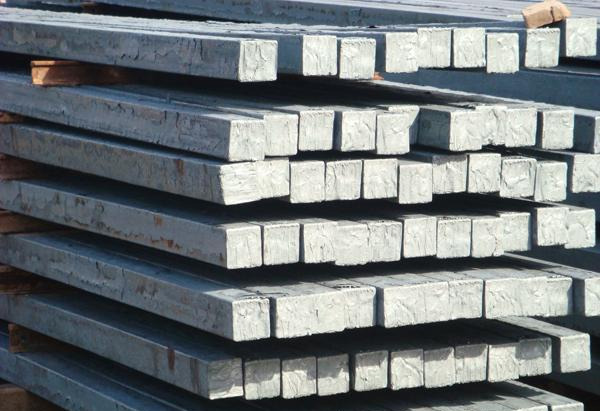
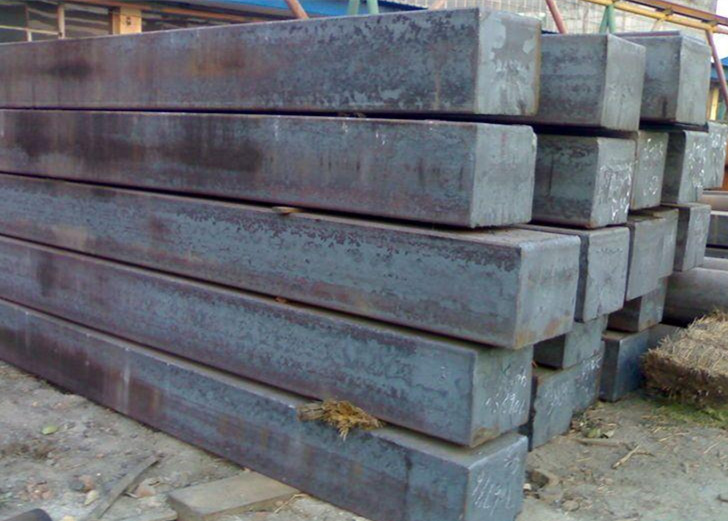
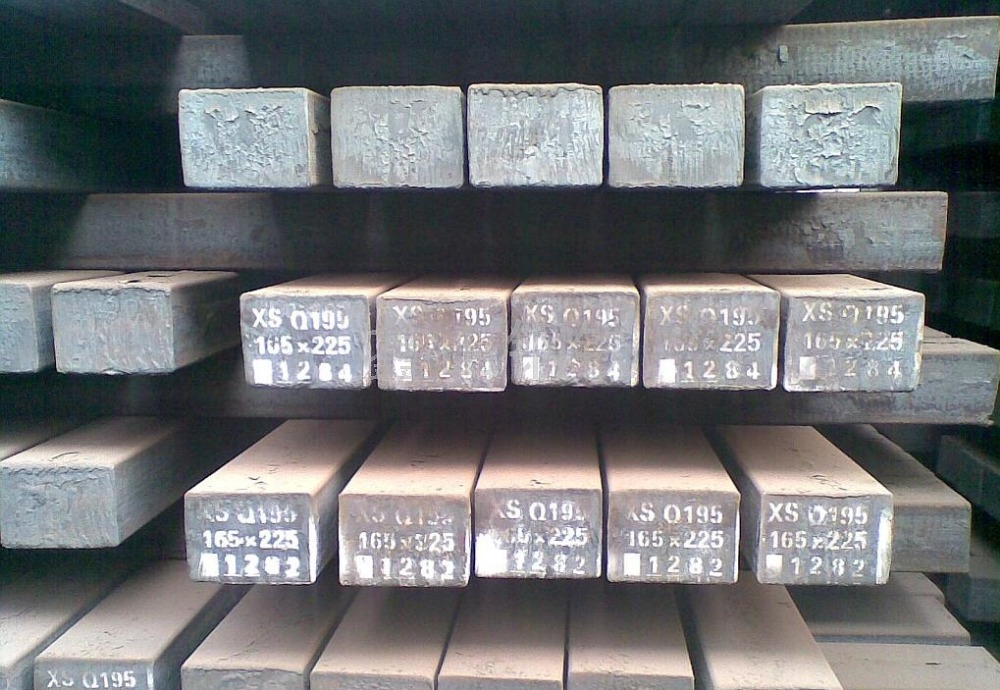
Application
The Billets produced by the company can be broadly divided into three main types i.e.
1. M.S. Billets
2. CRS Billets
3. Special Alloy Billets
M.S. Billets are used for rolling of TMT Re-Bars of Fe415 and Fe500 Grade and
various other structural steel products.
CRS Billets are used for rolling of CRS TMT Re-Bars.
Special Alloy Billets are used for rolling of any special grade TMT Re-Bars like
Earthquake resistant TMT Re-Bars and for special grade structural steel products.
Product Process
\
STANDARD | C(%) | Mn(%) | S(%) | P(%) | Si(%) |
Q195 | ≤0.12 | ≤0.50 | ≤0.040 | ≤0.035 | ≤0.30 |
Q235 | ≤0.20 | ≤1.40 | ≤0.045 | ≤0.045 | ≤0.35 |
Q275 | ≤0.22 | ≤1.50 | ≤0.045 | ≤0.045 | ≤0.35 |
20MnSi | 0.17-0.25 | 1.2-1.6 | ≤0.050 | ≤0.050 | 0.40-0.80 |
3SP | 0.14-0.22 | 0.40-0.85 | ≤0.050 | ≤0.040 | 0.05-0.15 |
5SP | 0.28-0.37 | 0.50-1.00 | ≤0.050 | ≤0.040 | 0.15-0.30 |
Shipment
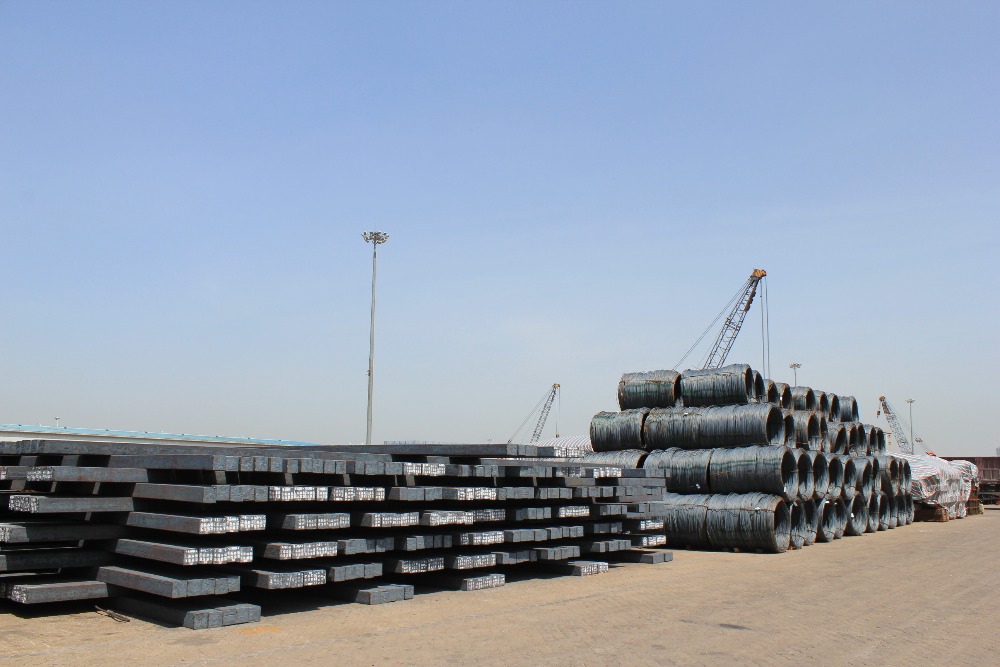
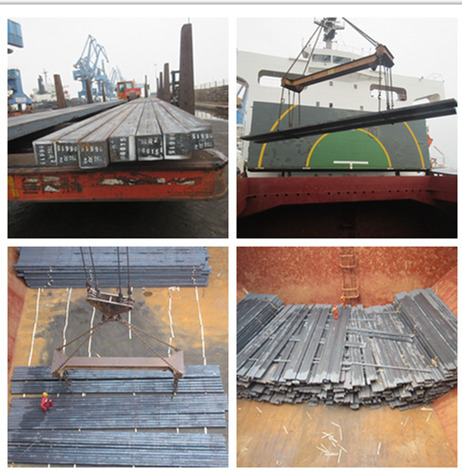
Our Service
Sample service
Sample service is available.The sample itself is cost free, but the clients who asked for the sample will be supposed to afford the delivery cost. For those clients who have already established business relation with us, even the delivery cost will be exempted.
Warranty
All the products will be supplied according to the detailed requirements claimed by the clients, including the quantity, the specification, as well as the quality etc. It is strongly suggested that appointa third party, such as SGS, to precheck the goods when they are well prepared for shipping.
After Service
After Service is always taken as one of the most important links.To enjoy this service, the clients' claim must be promptly reported to us, with all necessary information, including the order number, copy of the stamped sales contract, inspection report etc. Also, We should be given a reasonable period for inspection and verification.
- Q:How does steel pipe threading for plumbing applications work?
- Steel pipe threading for plumbing applications involves the process of cutting threads onto the ends of steel pipes to create a secure and leak-proof connection. This is typically done using a threading machine that rotates the pipe while a cutting die is applied to create the threads. The cutting die removes metal from the pipe, forming helical grooves, which align with the threads on fittings or other pipes. The threaded ends can then be joined together using pipe fittings or couplings, ensuring a tight and durable connection in plumbing systems.
- Q:What are the different types of steel nails and their applications?
- There are several types of steel nails available, each with specific applications. Common types include common nails, finishing nails, roofing nails, and concrete nails. Common nails are versatile and widely used for general construction and framing. Finishing nails have smaller heads and are used for delicate woodworking projects where the nail head needs to be concealed. Roofing nails have larger heads and are designed to secure shingles and other roofing materials. Concrete nails are hardened and used specifically for driving into concrete or masonry.
- Q:What are the different types of steel clamps and their uses?
- There are various types of steel clamps that serve different purposes. Some common types include C-clamps, bar clamps, pipe clamps, spring clamps, and toggle clamps. C-clamps are versatile and used for general applications, while bar clamps are ideal for woodworking and cabinetry. Pipe clamps are designed for securing pipes during plumbing work, and spring clamps are compact and suitable for light-duty tasks. Toggle clamps are used for holding objects in place during machining or welding. Each type of steel clamp has its unique features and applications, catering to different needs in various industries.
- Q:How can steel products be protected from corrosion?
- Steel products can be protected from corrosion through various methods such as applying protective coatings like paint or zinc, using corrosion-resistant alloys, electroplating, galvanizing, and implementing proper maintenance practices like regular cleaning and inspection.
- Q:What are the different types of steel bolts and their uses in the automotive aftermarket?
- There are several types of steel bolts commonly used in the automotive aftermarket, including hex bolts, flange bolts, carriage bolts, and specialty bolts like wheel bolts and exhaust manifold bolts. Hex bolts are the most commonly used and are suitable for a wide range of applications. Flange bolts have a built-in washer-like flange that distributes the load and provides extra strength. Carriage bolts have a smooth, rounded head and are often used in applications where a smooth finish is desired. Specialty bolts like wheel bolts are specifically designed for securing wheels to the vehicle, while exhaust manifold bolts are used to connect the exhaust manifold to the engine block. Each type of steel bolt has its own specific use and is selected based on the requirements of the automotive aftermarket applications.
- Q:How is steel used in the production of electrical transformers?
- Steel is used in the production of electrical transformers primarily for its magnetic properties. It is used to create the core of the transformer, which helps in the efficient transfer of electrical energy by reducing energy losses through magnetic induction.
- Q:What are the applications of steel forgings in the defense industry?
- Steel forgings have numerous applications in the defense industry. They are commonly used in the production of high-strength components and parts for military vehicles, aircraft, and naval vessels. Steel forgings provide exceptional durability, resistance to extreme conditions, and superior mechanical properties, making them ideal for critical applications such as armor plating, weapon systems, and structural components. Additionally, steel forgings offer enhanced reliability and safety, ensuring optimal performance and protection in defense operations.
- Q:How is steel used in the production of textile machinery?
- Steel is used in the production of textile machinery for its strength and durability, as it provides a sturdy framework for the machines. It is used to construct various components and parts of the machinery such as the frame, gears, and shafts, ensuring the machines can withstand the high pressures and strains associated with textile production.
- Q:What are the common types of steel products used in the chemical industry?
- Some common types of steel products used in the chemical industry include stainless steel, carbon steel, and alloy steel. These materials are chosen for their corrosion resistance, durability, and ability to withstand high temperatures and pressures. Stainless steel is particularly popular due to its superior resistance to chemical corrosion, while carbon steel is often used for less corrosive applications. Alloy steel, on the other hand, offers enhanced strength and performance characteristics through the addition of various alloying elements.
- Q:What are the properties of high-strength low-alloy (HSLA) steel?
- High-strength low-alloy (HSLA) steel possesses several key properties, including high strength, improved formability, excellent weldability, and increased resistance to corrosion. It is known for its ability to provide a perfect balance between strength and ductility, making it ideal for various structural applications. Additionally, HSLA steel offers cost-effective solutions due to its reduced need for additional alloying elements and heat treatments.
1. Manufacturer Overview |
|
|---|---|
| Location | |
| Year Established | |
| Annual Output Value | |
| Main Markets | |
| Company Certifications | |
2. Manufacturer Certificates |
|
|---|---|
| a) Certification Name | |
| Range | |
| Reference | |
| Validity Period | |
3. Manufacturer Capability |
|
|---|---|
| a)Trade Capacity | |
| Nearest Port | |
| Export Percentage | |
| No.of Employees in Trade Department | |
| Language Spoken: | |
| b)Factory Information | |
| Factory Size: | |
| No. of Production Lines | |
| Contract Manufacturing | |
| Product Price Range | |
Send your message to us
Prime Mild Square Steel Billet/Billets/Square Billet Steel
- Loading Port:
- China main port
- Payment Terms:
- TT OR LC
- Min Order Qty:
- 20 m.t.
- Supply Capability:
- 10000 m.t./month
OKorder Service Pledge
OKorder Financial Service
Similar products
New products
Hot products
Related keywords
